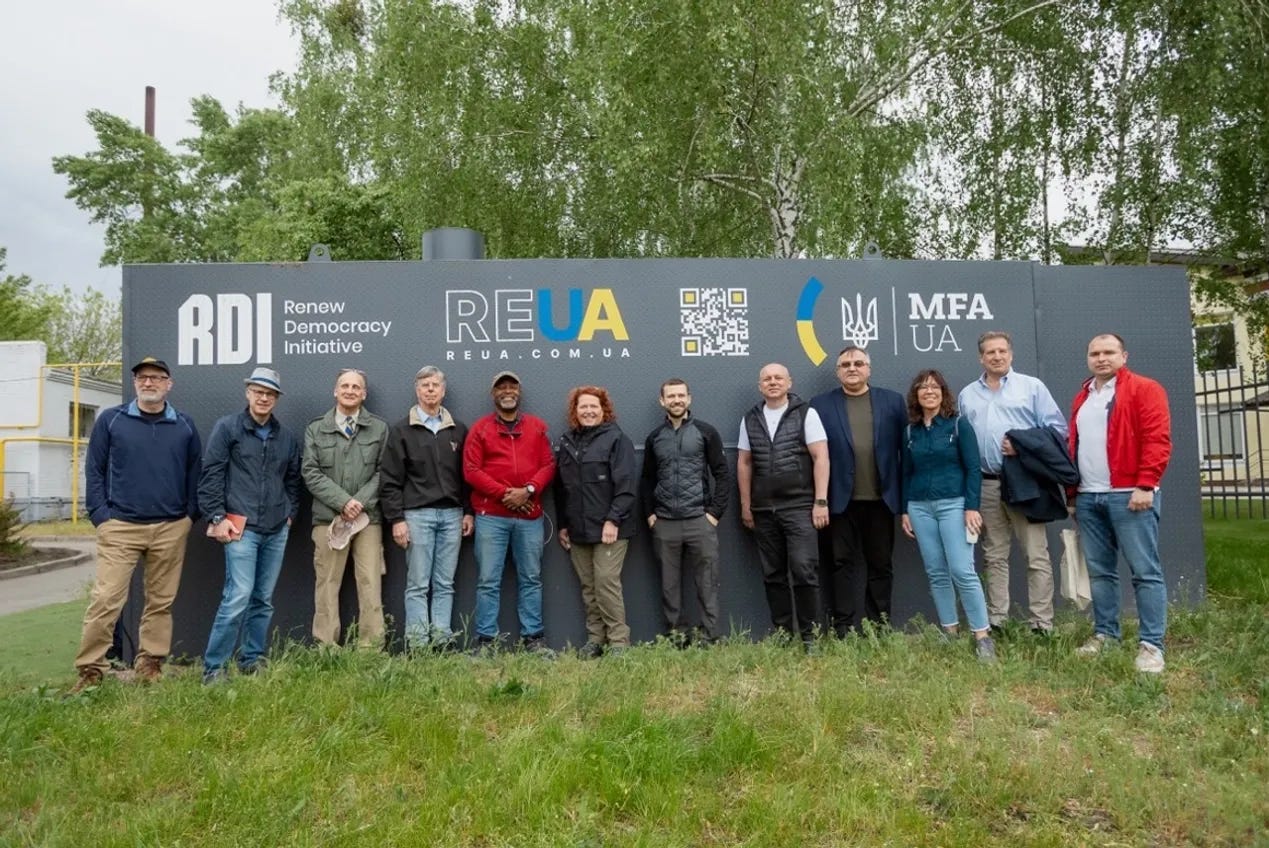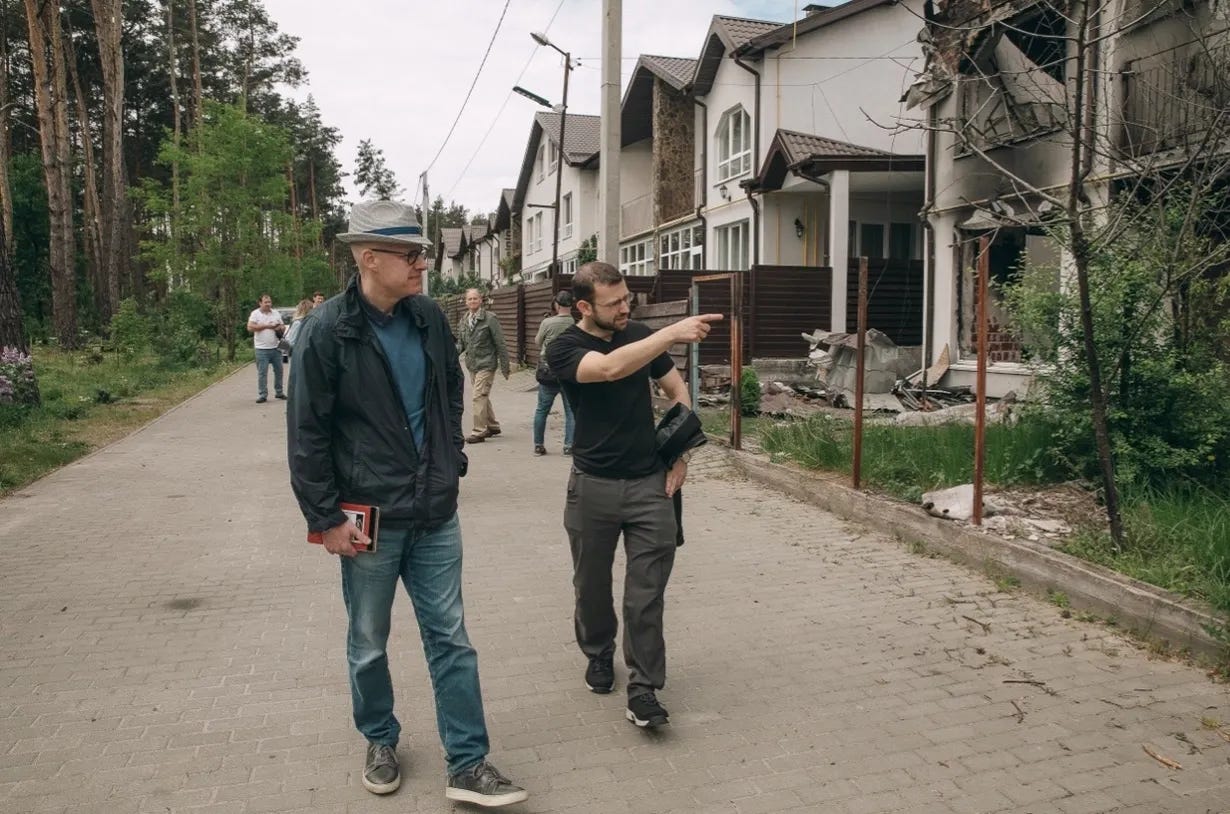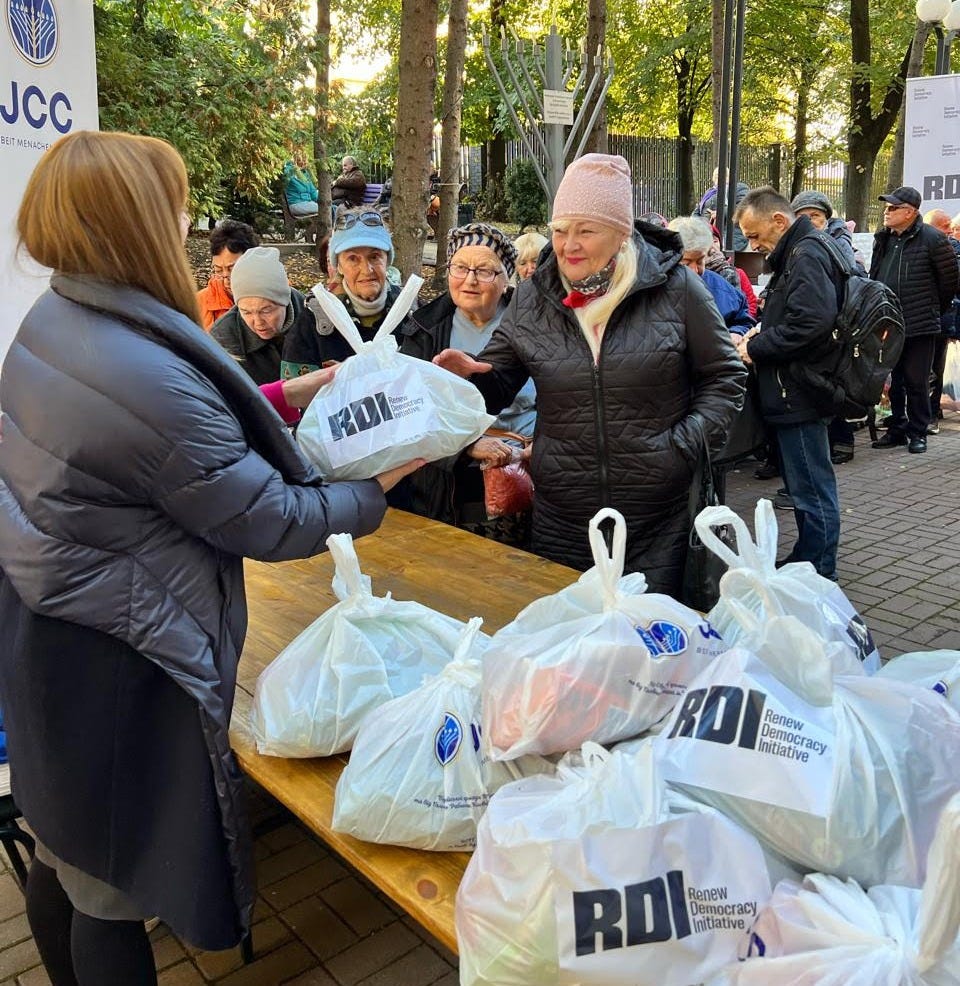In Ukraine, Renew Democracy Initiative is Matching Words with Action
We don’t just talk about supporting freedom.
EDITOR’S NOTE: With new conflicts and crises crowding the headlines, it’s important to remember that Ukrainians are still fighting and dying for freedom. At The Next Move, we publish a lot of analysis about Ukraine and Russia. But we don’t just talk—we act. Our parent organization, Renew Democracy Initiative, has raised over $13 million in direct aid for frontline communities in Ukraine since February 2022. Read this interview with RDI CEO Uriel Epshtein from Kyiv Post’s Jason Jay Smart to learn more about our on-the-ground work.
This piece was originally published in Kyiv Post. It is republished here with permission.
Two startling World Food Programme statistics reveal the gap between the image of international solidarity with Ukraine’s innocents and the situation on the ground:
Over half of all towns within 10km of the frontlines do not have a functioning market. And more than half of all towns within 30km of the frontlines lack necessities such as food, water, electricity and medicine.
One relatively small American organization is working to change that. The Renew Democracy Initiative was founded by World Chess Champion and Russian political dissident Garry Kasparov to advance the values of freedom and challenge authoritarianism. Though it’s primarily an advocacy organization, through its Ukraine aid program, RDI is doing what CEO Uriel Epshtein, 33, calls “putting our money where our mouth is” and getting into the humanitarian aid business. Though RDI has just a handful of full-time employees in Washington DC and New York, the organization has delivered millions of dollars in aid to Ukrainians with a notable focus on getting assistance to difficult-to-reach regions near the frontline.
Kyiv Post spoke with Mr. Epshtein about RDI’s work in Ukraine:
Jason Jay Smart, Kyiv Post: First, the most important question when it comes to aid: How much, and what?
Uriel Epshtein, RDI: RDI has provided more than $13 million in aid to frontline communities in Ukraine since February 2022. That means those closest to the Russian invasion (Kharkiv Oblast has been an area of special focus for us). Counting it all out, this aid includes over $1,500,000 in medical supplies, nearly 500,000 meals ready to eat, over 70,000 sleeping bags, and eight mobile water filtration units, which are capable of delivering safe drinking water to 30,000 people daily. This year, we also started piloting a program that teaches how to more effectively manage nonprofits including through grant-writing and metrics tracking for Ukrainians in the NGO space to give their organizations a better shot at forming partnerships with peers in the US and Europe.
KP: What led you to get involved with humanitarian aid to Ukraine?
UE: We believed that at a moment when a free nation like Ukraine was facing an existential threat, it wasn’t enough for us to merely talk about convincing others to do the right thing. In order to be credible, we had to go further and actually help people on the ground.

KP: A lot of organizations provide aid to Ukrainians – and their primary focus is humanitarian aid. What makes you different?
UE: Our giving philosophy is to focus on the things Ukraine needs to survive on their own land and repopulate areas liberated from Russia. We think of our giving as “humanitarian HIMARS” – relatively small grants that can have a disproportionate impact on the situation on the ground. To develop internal Ukrainian capacity, we also ensure that as much of our aid as possible is produced in-country.
Meanwhile, our small team has unique skills and insight allowing us to navigate the complexities that come with operating in Ukraine, particularly as the nation is fighting for its life. I was born in the US, but my mom is from Kyiv, and Russian is my first language – despite Putin’s propaganda, which would have you believe Ukrainians are Russophobic fascists – Russian remains widely spoken. And I have a fair bit of subject matter expertise, so I can ensure that each dollar we provide goes exactly where it needs to in order to have the greatest possible impact. Meanwhile, [Former World Chess Champion and Russian dissident] Garry Kasparov is our founder and chairman – he’s well known and that gives us a real leg up in building relationships.
This all allows us to work with groups that can reach deeper into Ukraine and support people living right up against the frontlines in ways that other, larger organizations or groups with more general expertise might struggle to do. As Ihor Terekhov, the mayor of Kharkiv, has noted, we take aid “right to the line of contact.” We take aid where it needs to go – no need for middlemen or proxies.
KP: But a big focus for you is still the broader information war around Ukraine, right?
UE: Exactly. There’s one battle on the frontlines in Ukraine itself, and then there is the battle being waged in Washington and the other Western capitals, where you need to reach both the broader public and elected officials. RDI is operating in both arenas. On the information side, we’re all about strategically targeting audiences with innovative messages and unexpected messengers. We organized a campaign to support the transfer of frozen Russian assets to Ukraine that made it to the Oval Office and helped inspire the REPO Act, which affirmed the president’s authority to turn over those funds to Kyiv. When Republican support for Ukraine was flagging, we brought a group of British Conservative politicians led by former Prime Minister Liz Truss to [Washington] DC to frame support for Kyiv in terms the GOP would relate to – 13 of the 22 members of Congress with whom our delegation met ended up supporting aid to Ukraine. And this isn’t just in the US: we also ran ads in Europe’s biggest newspaper calling for Germany to step up its military aid to Ukraine.

KP: A word about your Board Chair: Garry is a leader in the Russian opposition (to the extent it still exists). But since 2014 and especially after 2022 there’s been a lot of scrutiny in Ukraine directed at all Russians, even anti-regime activists. How does this impact your work?
UE: It’s a fair question. Look, Ukrainians have every right and reason to be skeptical of the Russian opposition. Many were not sufficiently vocal about the first phase of the invasion of Ukraine – that is, the war that began in 2014 with the annexation of Crimea. Some even supported it. But that’s not and never has been Garry, and I think Ukrainians recognize this. He opposed all Russian aggression in Ukraine from day one. And he’s been clear in stating that a free Russia requires a victorious Ukraine that is able to recover all of its territory, including Crimea – and demanding that other Russians affirm the same. In my experience, almost all Ukrainians we’ve met recognize the difference.
More from The Next Move
If anything, it disproves Kremlin propaganda about supposed “Ukrainian Russophobia.” After over a decade of war, it’s on the Russian opposition, not Ukrainians, to prove they’re acting in good faith, and Garry is offering a model for how it’s done. So on balance, Garry’s reputation has been a net positive – it adds a lot of value and credibility.
KP: I noticed RDI doesn’t really seem to work with refugees. Why is that?
UE: RDI does not focus on refugee support, and there are a few reasons for that. There are a lot of organizations doing admirable work with Ukrainian refugees, so we’re not trying to create redundancies. More than that – in any war, a lot of people are going to get uprooted, and someone needs to support those refugees. But not everyone has the mobility to leave. And someone also has to ensure that Ukraine remains a viable country the day after the fighting is over. That means ensuring that those who cannot or do not want to flee are able to remain in their homes. Those communities – especially on the frontlines – are going to be the cradle of a victorious, restored Ukraine and that’s our area of focus.
KP: Where does this humanitarian aid fit into RDI’s work? A lot of what you do is intellectual–publishing articles, social media campaigns, and so on.
UE: You’re right to point out that getting our hands dirty in the humanitarian aid space isn’t exactly normal for a DC advocacy organization. RDI’s mission – I’m paraphrasing here – is to take down the “international alliance of dictators.” Vladimir Putin is at the center of that unholy alliance. Supporting Ukrainians on the frontlines is the best way that we, as civilians, can do to confront Putin and his accomplices. It’s one thing to talk about how to help Ukraine, and another thing entirely to provide the tools and infrastructure Ukrainians need to stay in the cities and towns that Russia wants to occupy and annex. We are quite literally putting our money where our mouth is. Given RDI’s special expertise in that area, we have no excuse not to live up to our mission in Ukraine.
More from The Next Move
How to Understand Tucker Carlson’s Interview with the President of Iran
When it comes to dictators, Tucker Carlson presents a false choice between censorship and softball interviews. There’s another way.
Space United Us. Putin Tore Us Apart.
A former International Space Space Station commander writes: Watching my Russian cosmonaut friends turn to the dark side was a troubling lesson in how easily normal people can be bribed into supporting a tyrant.










Thank you, I did not know that Urial have been in Ukraine. Garry Kasparov and the Free Russia Forum are the best thing in our so-called russian opposition. And I have seen several times on Twitter that Ukrainians consider him the only or one of the few adequate representatives of the russian opposition.